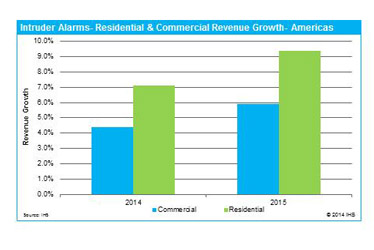IHS Technology projects that the Nest acquisition paired with the emergence of Google Fiber foreshadows Google's eventual penetration into the home security space through home automation integration.
Google entered the smart home market in January after acquiring Nest, a smart thermostat and smoke/CO detector manufacturer, for $3.2 billion. IHS Technology projects that the Nest acquisition paired with the emergence of Google Fiber foreshadows Google's eventual penetration into the home security space through home automation integration.
The competitive landscape in the home security space continues to increase as more entrants look to penetrate the market's growth opportunity. IHS projects the Americas residential intruder alarm market to grow 7.1% and 9.4% in 2014 and 2015 respectively. The commercial market is forecast to grow 4.4% and 5.9% during this period in comparison.
In an IHS contributed articled published in last year's ISC West Show Daily, IHS predicted more entrants would enter the industry following the footsteps of telecommunication companies such as Comcast, AT&T, Time Warner, and many others.
These companies along with traditional intruder alarm providers are driving the penetration of home security systems by integrating home automation features such as energy management, intelligent door locks, and self-monitoring video cameras with security systems. Allowing end-users to interact with their systems remotely via smartphone or tablet is another added benefit that is driving adoption of these solutions. IHS projects the US residential penetration rate for intruder alarm products to increase 5-8% for over the next few years as a result of this trend.
Nest's product line falls within the home automation space more so than security, but as the trend to combine the two blossoms it seems evident that Google will develop a security hardware offering as well. The strong growth opportunity in the intruder alarm industry could potentially lead even more companies attempting to enter the space. The influx of competitors has been welcomed by the industry so far because it helps increase the penetration rate of home security systems; however whether there is enough room for everyone to flourish becomes a more important topic as the market matures.
